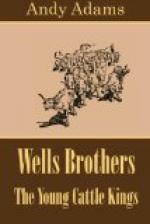CHAPTER XVII
“THE WAGON”
The little ranch had assumed a contract and must answer at the appointed time. If the brothers could meet their first commercial obligation, it would establish their standing, and to that end every energy must be directed. They were extremely fortunate in the advice and help of two young men bred to the occupation, and whose every interest lay in making a success of the ranch.
The trail outfit returned to the railroad that night. Everything was abandoned but their saddles—burning the wagon—while Joe Manly, one of their number, remained behind. Manly was not even the foreman, and on taking his departure the trail boss, in the presence of all, said to his man, “Now, Joe, turn yourself over to this ranch and make a useful hand. Drop old man Dudley a line whenever you have a chance. It’s quite a little ride to the station, and we’ll understand that no news is good news. And once you see that these cattle are going to winter safely, better raise the long yell and come home. You can drift back in the fall—during the beef-shipping season. I may write you when next summer’s plans begin to unfold.”
Accompanied by Dell and Sargent, and singing the home songs of the South, the outfit faded away into the night. Forrest’s herd had watered during the evening, and moved out to a safe camp, leaving its foreman on the Beaver. He and Manly discussed the situation, paving the way in detail, up to the manner of holding the cattle during the coming winter. With numbers exceeding three thousand, close herd and corralling at night was impossible, and the riding of lines, with an extra camp, admitting of the widest freedom, was decided on as the most feasible method. The new camp must be located well above Hackberry Grove, and to provision it for man and horse was one of the many details outlined in meeting the coming winter. Joel was an attentive listener, and having held cattle by one system, he fully understood the necessity of adopting some other manner of restraint. In locating cattle, where there was danger of drifting from any cause, the method of riding lines was simple and easily understood—to patrol the line liable to assault from drifting cattle.
Forrest was elated over the outlook. On leaving the next morning, he turned his horse and rode back to the tent. “This may be the last time I’ll come this way,” said he to Joel, “as there is talk of the trail moving west. On account of fever, this State threatens to quarantine against Texas cattle. If it does, the trail will have to move over into Colorado or hunt a new route through unorganized counties on the western line of Kansas. In event of quarantine being enforced, it means a bigger range for Wells Brothers. Of course, this is only your second year in cattle, just getting a firm grip on the business, but I can see a big future for you boys. As cowmen, you’re just in swaddling clothes yet, toddling around on your first legs, but the outlook is rosy. Hold these cattle this winter, protect your credit next fall, and it doesn’t matter if I never come back. A year hence you’ll have a bank account, be living on the sunny side of the creek, and as long as you stick to cows, through thick and thin, nothing can unhorse you.”




